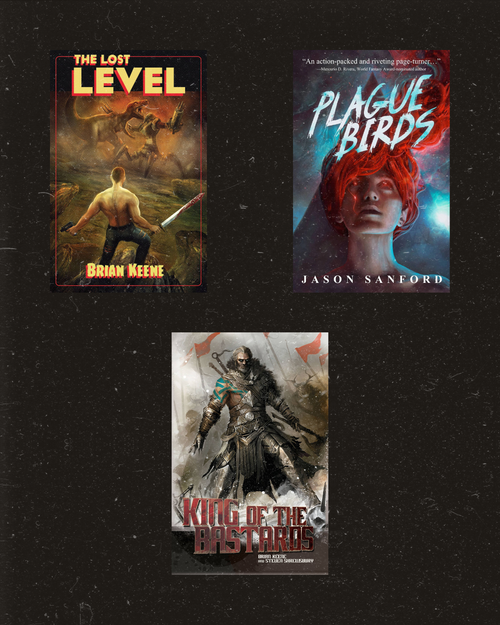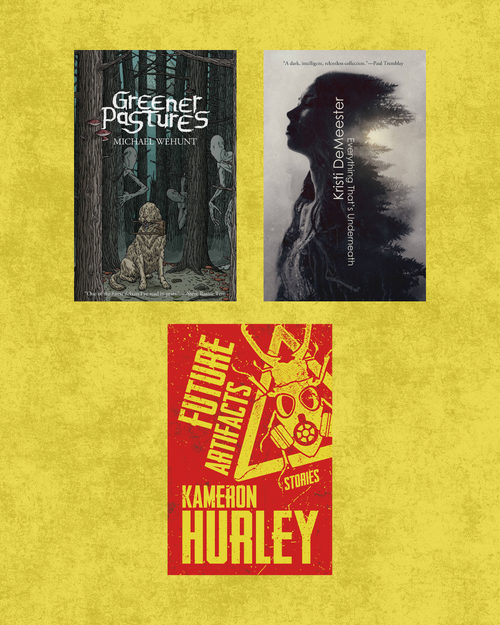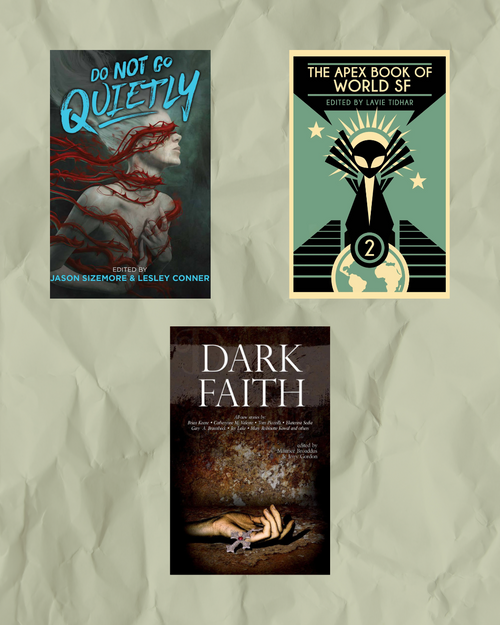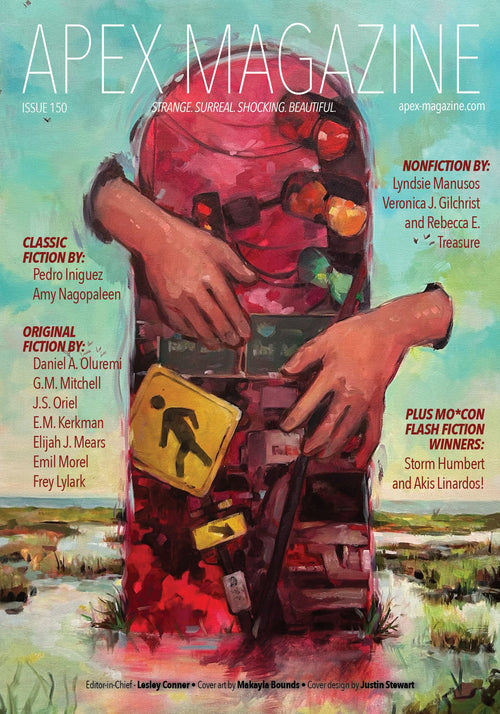Greener Pastures
by Michael Wehunt
“You ever can’t sleep?” the trucker said.
Forsyth glanced up out of his thoughts. The man standing at his table was big and worn out, his eyes raw and heavy even in the shadow of his cap’s bill. He had a young face with an old beard matted on the left side, as though he’d been trying to nap against the window of his cab.
The trucker slid into the booth but Forsyth didn’t answer his question at first. He felt the contradiction of road life, that of the lonesome loner. It could be nice to have company when he stopped off someplace, but he’d never been much for talk. He glanced around the diner. A couple more long-haulers sat on high stools at the counter, knives and forks chattering against their plates. The waitress was somewhere back in the kitchen. Even for a graveyard shift the place had a tired air.
Forsyth was bleary-eyed himself. Two grinding days, Little Rock to Birmingham to Atlanta and now he was racing the sun to Valdosta. Coming up on three hours of dark left, and by first light he meant to be on the cot in the back of his empty trailer. He’d have enough time for a quick snooze, and then all the state troopers in hell couldn’t keep him from his daughter’s sixth birthday the next night. Last week the two of them had started reading their first bedtime story together. Lizzie had fallen asleep just as the wolf huffed and puffed at the second pig’s house. Forsyth couldn’t wait to finish it. He’d been getting along with his ex-wife, too. No way was he losing that momentum.
The big trucker watched him across the booth. “You ever can’t sleep?” he asked again.
“I got a feeling,” Forsyth told him, “you’re not talking about putting off a nap until you get to where you’re going.”
“No, I’m not.” The trucker stared out the window as he spoke.
Forsyth followed his eyes. Only things out there were four rigs lined up in the gloom beyond the sodium lamps and an old Ford wagon off to the far side. Those lamps weren’t doing much against the miles of night surrounding the place. Even the lights set into the diner’s flat roof didn’t seem to touch the lot. Still, it was just another diner along I-75. It didn’t have a town around it, that was all.
Forsyth turned back to his temporary buddy. “Insomnia, then? That it?”
“Something like it,” the trucker said, and his face reflected in the window seemed...Forsyth didn’t want to call it spooked. Distracted, maybe. Enough years spent boxed in on tiresome roads and it was a simple thing to think a man was haunted.
“Hell, I think I’ve slept about every way a man can,” Forsyth said. “I got used to it. How long you been hauling?”
“Three years, nearing on four.”
“I get my two-year badge next month. How long you had insomnia?”
He turned and regarded Forsyth with those weary eyes. “I didn’t say it was insomnia. I said it was something like it, didn’t I?” And his gaze went back out the window.
“That you did, fella.” Forsyth wasn’t about to whet that edge in the man’s voice, but he was curious. “I’m Forsyth, by the way. And before you ask, yes, that’s my first name. My mother’s maiden name.”
He stuck his hand out but the trucker kept on searching the dark, absently turning his coffee mug around on the table. It produced a slow, maddening scrape.
“So what is it, then, if it’s not insomnia?” He returned to his hash browns and eggs, left the man to his view.
“You ever wonder if anything’s out there with us? When we’re driving through the night and all these big gaps of world between towns? You got pieces of map where you can lay a quarter down and there’s nothing under it.”
“You mean the rural areas?” Forsyth asked.
He waved that aside. “No, no. That’s not what I’m saying, man. I don’t mean like farms and woods, this road connecting to that road so you can go from there to here. I’m talking about the space in between.”
“I’m not sure I—”
He cut Forsyth off, really throwing himself into gear now. “I’m curious what it is that makes all that space up. And can it take notice of you. Might be the wondering that draws it. I knew a guy once, this was up in South Dakota, he’d haul loads for miles with just the headlights for company. Black as a pit out there, I can tell you. Not many lights strung along some of those roads. Well, Hitch—we called him that because he’d get bored and pick up hitchhikers—he went missing last year. Cops found his rig idling on a shoulder in the middle of nowhere. Right in one of those pieces of map.”
Forsyth pushed his cold eggs away. The trucker stared at his hands for a minute before looking back outside.
“There’s something about the lonely places. Something about us folks who go to them. Like rest stops. A month ago I saw Hitch at one in Virginia. Guy was peeking out of the trees behind the bathrooms whispering my name. I could hear him grinning. He started talking about the sky dripping on him, the night folded over like a blanket. He asked me to—oh Jesus.”
“What?” Forsyth peered through the glass to see what had put that sudden watery groan in the trucker’s last words. It was still just a parking lot, silent and waiting for cars. This place was from a faded era. He doubted it saw many customers even in the best of times. That was half the reason he’d stopped here.
“It’s darker,” the trucker said. “Look close and you can see everything slinking around.”
Forsyth thought he was right about the dark, at least. The streetlights near the entrance, long necks on fifteen-foot stems, were out. The diner huddled in its own small glow now. An island. He could just pick out his rig—a glimpse of red paint—alongside the others, and he could see the edges of the forest that wanted to swallow it all. But nothing moved.
Forsyth tried a different tack. “All due respect, mister, I think you need to try for some of that sleep you can’t seem to find. I doubt coffee’s helping much.” Over by the counter the two other men stood and stretched their backs. They settled caps on gray heads and made their way into the night. Forsyth caught furtive glances from both of them. A stream of cool air slipped inside. It had gotten colder as well as darker.
They sat in silence and watched the pair of old truckers pass in front of the building and dissolve into the encroaching shadows. Neither said as much but they were waiting for their rigs to chug into life, for the big headlights to cut the gravel dust.
Quiet rippled. Forsyth thought that maybe another light had fizzled out. The far end of the diner felt like another county.
The trucker looked at him. “I think those gaps between places are filling up. Something’s looking for us. Couple of weeks back my mama started talking to me on the CB.” He kept swiveling his coffee cup, only now Forsyth was almost glad for the sound. “I know what you’re thinking, and it ain’t ghosts. My mama’s alive and well. Lives in Charlotte and volunteers at the hospital.” His eyes dropped to the table again and he drained the mug. Set it down and went back to turning it.
“Your mama got a radio?” Forsyth would have liked some coffee himself but the waitress had yet to come back up front.
“Nah, she’d hardly know what to do with one. But I hear her. Different channels too. She tells me to pull over sometimes, get out of the cab and walk into a field and look up at the stars. Just lie down there in a bed of grass. She talks about greener pastures waiting. Get out and walk into the night, Sally—that’s what she calls me, Sally. Always seems to be when it’s darkest, right in the crease between midnight and that first streak of morning.”
Forsyth put his head in his hands. His expected thought—something along the line of getting away from this man and back on the road—wouldn’t come to him. Somehow he found himself fixated on all the blank space in the world. He felt he’d known it for some time, from the corners of his eyes. There was an awful lot of it between here and Valdosta, even on the interstate. He kept his CB off as a rule, but would he flip it on tonight when he settled into the driver’s seat?
He glanced outside again and saw another light in the eave had gone dark. Their corner of the lot was the only beacon left. The light inside the diner might as well have been held in a box. It stopped inches beyond the windows.
“Some nights I see people running up a ditch to the road as I drive by,” Sally said, “or standing in the trees. I’d call them pale. I’d call them pale enough to glow, except they’re not. They’re as dark as the dark, but I see them just fine. And then the radio starts crackling and my mama’s talking me out of the truck.”
“Come on now,” Forsyth said, “you got to know that’s not your mama. What you’re talking about sounds like sirens luring sailors to their deaths or something. I mean, CB isn’t what it used to be, but people still play with it.”
“Whoever it is, she knows I ran away when I was eight because she and Dad put my dog down. She knows the name of the magazine she found under my mattress a few years later. Dad, now, he died ten years ago. Cancer. Never been his voice coming out of the CB.”
“How come I haven’t heard of this? I’m on the road about as much as you.” Forsyth wanted to laugh, but instead his mind got snagged on the rest area whose lot he’d napped in earlier that morning. Anonymous brick squatting in the drone of highway traffic and Georgia pines scenting the air. All those unnoticed trees. Over the years he’d relieved himself in hundreds of those facilities. He’d bought undrinkable coffee, washed the sleep out of his eyes, even jerked off once or twice to clear his head. Lonely places, yes, Sally was right. He felt the deeper possibility of it unfurl in his head like a fever.
But no matter how empty a diner found itself, it wasn’t a rest stop. It had a pulse. A constant heartbeat. He craned his neck to look for the absent waitress again.
“Well, now you have. I didn’t know until Hitch told me.” Sally’s grin was both sly and shameful. His lips stayed pressed together inside the snarl of beard. It was the first time his face had come alive with something other than a jittery fear.
“Those two guys haven’t started up their rigs yet,” Forsyth said. He’d meant to just change the subject, clear that leering smile from Sally’s face, but realized he was speaking one notch above a whisper. Both of them watched the black humps of the trucks still as felled trees in all that shadow. “Probably napping. Or napping with each other.”
Neither man cracked a smile.
“Tonight Mama said I should stop here and rest a while. Lay my troubles on a kindred spirit, is how she put it. I don’t think they like the voices of the dead. On account of the dead are the ones we’ve let go of.” Sally pushed his cup away and stood up. “This place does seem like one of those gaps. It’s not like there’s much of anything out here. But you wait until you leave. You’ll get it now.” He looked through the window again. “I gotta take a leak.”
He shuffled toward the little hallway in back. Forsyth watched him push into the men’s room. He got up himself and walked over to the coffee station, grabbed a mug and filled it. Found some half and half and a spoon. When he got back to the table he saw at once that the outside light above his booth’s window was the only one still lit up. The dark gathered close, pressing against the glass, and he tried not to look for things shifting in it.
He poured the creamer in and stirred his coffee. The clink of the spoon unnerved him. It was too much like an alarm bell. He needed to be on the road now in order to have any chance of getting back to Little Rock by suppertime tomorrow. But he sat there, eyes dragging to the window then yanking away. He pictured the radio in his rig and could almost hear a sea of static, and what would he do if his own mother began calling out to him from her nursing home in Tucson, edging him toward the rocks?
The dark outside was too active and all four trucks sat buried under it. No reason they should have been silent. Those two veteran truckers would idle their engines on a cold night. He’d never met one who wouldn’t. Diesel ran long.
In the window he could see the restaurant’s reflection, so he watched both the lot and the hallway behind him while he waited for Sally to return. He thought of the stack of books he’d bought for Lizzie’s birthday. Rachel would give him a real smile for those. Their daughter was going to hit kindergarten running. And when he wheeled in the purple bicycle at the end, right around the time Lizzie thought the presents were done for the year...well, he figured Rachel might have something more than a smile to offer.
Forsyth sat there and Sally didn’t come back. He kept his eye on that last bulb shining out in the dark. A white face might have drifted into sight before retreating. He wasn’t sure. The key to his rig was heavy in his pocket.
In the other pocket his phone buzzed. He jumped in his seat before fishing it out. Nothing on the screen, not even “incoming call.” He tapped the phone and held it up to his ear and listened.
“Daddy?” Lizzie’s voice came as though she were sitting in his lap. “Daddy!”
“Baby?” His mouth went dry. “What are you doing up? You need to be in bed, hon.” He said the normal things, the daddy things, his fingers pinching the bridge of his nose hard enough to hurt.
“I’m not sleepy. Come outside, Daddy. I’m in the trees.”
“No, baby, you’re not in the trees. You’re dreaming.” He started touching everything on the table, coffee cup, plate, silverware. He gripped the napkin dispenser in his hand and tried to squeeze it into something else. An anchor, anything to keep him fastened to his seat. He shouted Sally’s name into the empty diner.
“He’s with his mommy. Come outside, Daddy. It’s my birthday. It’s tomorrow now.”
Forsyth nearly fell to the floor as he lurched out of the booth. He staggered across the room and down the short hall and banged into the restroom. Empty, it could have always been empty but for the window half-open in the wall above the urinal. Cold air, somehow darkened air, fell through it. The tube lights in the ceiling fizzed. He slammed the window shut and checked the single stall. A strip of tissue was draped over the toilet.
“Told you, Daddy. Come look at the stars with me. They’re birthday stars.”
He clamped the phone to his ear as he went back to the counter, stood by the register a moment, then pushed through the swinging door into the kitchen. “Hello?” he called. The waitress had to be here. A cook, somebody. But there was only a low murmur of talk radio voices from the back. They faded into a wash of fuzz and then his older brother whispered his name. Paul, who lived way up in Vancouver. They’d talked on the phone just last week. Forsyth heard his name again, louder, and fled back into the dining area.
“You’re not my Lizzie,” he said into the phone.
“Please, Daddy.” His daughter’s one-more-story voice, the one he’d been longing to hear, perfect down to the pleading end. “Come finish. I want to know if the pigs go outside to the wolf.”
A hinge creaked behind him from the kitchen door. Soft breaths from the phone, waiting. He pictured his little girl tucked under a furry blanket six hundred miles away, green eyes peeking out, the spill of her fine light hair. He pictured her needing him, heaved a deep breath and stepped out into the close cold of the night.
Just get to the truck and out of this creepy place. His keys were in one hand, the phone still raised in the other. A tiny gleam of light reflected off his chrome grille, a hint of red side panel, and he fixed his eyes on it. Just get to the truck. The shoulder of his jacket whispered along the wall of the diner and he jerked away from it.
A small, bright laugh came from somewhere close. He heard it in his ear in the same instant. Rustling ahead, the faint crunch of gravel. When he reached the corner, the vast black space opening before him, he paused and looked up. No moon hung in the endless stars. That one light in the eave of the diner’s roof had been holding on, bravely throwing out its white heaven for Forsyth. Now it flickered and winked and was gone.
Originally published in Aghast #1 (2015)













